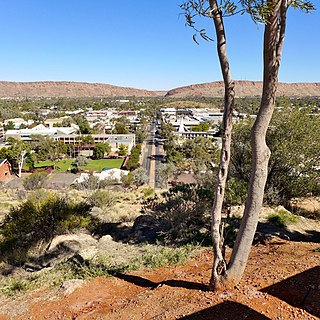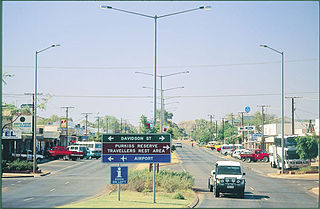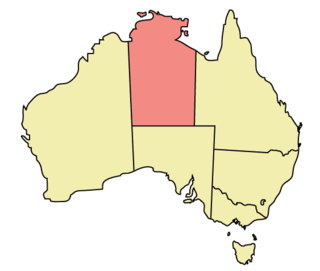
Alice Springs is the third-largest town in the Northern Territory of Australia. Known as Stuart until 31 August 1933, the name Alice Springs was given by surveyor William Whitfield Mills after Alice, Lady Todd, wife of the telegraph pioneer Sir Charles Todd. Now colloquially known as The Alice or simply Alice, the town is situated roughly in Australia's geographic centre. It is nearly equidistant from Adelaide and Darwin.

Tennant Creek is a town located in the Northern Territory of Australia. It is the seventh largest town in the Northern Territory, and is located on the Stuart Highway, just south of the intersection with the western terminus of the Barkly Highway. At the 2016 census, Tennant Creek had a population of approximately 3,000, of which more than 50% (1,536) identified themselves as indigenous.

Yuendumu is a town in the Northern Territory of Australia,293 kilometres (182 mi) northwest of Alice Springs on the Tanami Road, within the Central Desert Region local government area. It ranks as one of the larger remote communities in central Australia, and has a thriving community of Aboriginal artists. It is home to Pintubi Anmatjere Warlpiri (PAW) Media, which produced the TV series Bush Mechanics.

Crime in the Northern Territory is managed by the Northern Territory Police, the territory government's Department of the Attorney-General and Justice and Territory Families.
The Cape York Institute for Policy and Leadership, also known as the Cape York Institute, is an Australian public policy organisation which researches and implements welfare reforms to reduce social inequalities between Indigenous and Non-Indigenous peoples living in Cape York. The Cape York Institute was founded by lawyer, academic and Indigenous welfare advocate Noel Pearson. Established in July 2004, the organisation was developed in collaboration with the people of Cape York and Griffith University. The Institute prepares reports and submissions to the Australian Federal Government, identifying priority areas of welfare and economic reform to restore social norms within the Cape York communities. To deliver welfare and economic reform, the Institute engages with a number of partner organisations including the Cape York Partnerships, Family Responsibilities Commission, Balkanu Cape York Development Corporation and the Cape York Aboriginal Australian Academy. The Cape York Institute receives Commonwealth and Queensland State Government funding to support Welfare Reform Projects in areas of Indigenous education, employment, families and housing.
An outstation, homeland or homeland community is a very small, often remote, permanent community of Aboriginal Australian people connected by kinship, on land that often, but not always, has social, cultural or economic significance to them, as traditional land. The outstation movement or homeland movement refers to the voluntary relocation of Aboriginal people from towns to these locations.
Indigenous Australian self-determination, also known as Aboriginal Australian self-determination, is the power relating to self-governance by Aboriginal and Torres Strait Islander peoples in Australia. It is the right of Aboriginal and Torres Strait Islander peoples to determine their own political status and pursue their own economic, social and cultural interests. Self-determination asserts that Aboriginal and Torres Strait Islander peoples should direct and implement Aboriginal and Torres Strait Islander policy formulation and provision of services. Self-determination encompasses both Aboriginal land rights and self-governance, and may also be supported by a treaty between a government and an Indigenous group in Australia.

Amata, formerly known as Musgrave Park, is an Aboriginal community in the Anangu Pitjantjatjara Yankunytjatjara Lands in South Australia, comprising one of the six main communities on "The Lands".
A community legal centre (CLC) is the Australian term for an independent not-for-profit organisation providing legal aid services, that is, provision of assistance to people who are unable to afford legal representation and access to the court system. They provide legal advice and traditional casework for free, primarily funded by federal, state and local government. Working with clients who are mostly the most disadvantaged and vulnerable people in Australian society, they also work with other agencies to address related problems, including financial, social and health issues. Their functions may include campaigning for law reform and developing community education programs.

David Selvarajah Vadiveloo is an Australian lawyer, human rights and education consultant, cultural broker and screen producer.
The Community Development Employment Projects (CDEP) was an initiative by the Australian Government for the employment of Aboriginal and Torres Strait Islander people It provided a flexible basic income support.

Bagot Community is an Aboriginal community in the Northern Territory of Australia located in Ludmilla, a northern suburb of the city of Darwin. It was established in 1938 as the Bagot Aboriginal Reserve, when the Aboriginal residents were moved from the Kahlin Compound, it was also sometimes referred to as the Bagot Road Aboriginal Reserve.
Pat Turner is an Aboriginal Australian of Gudanji-Arrernte heritage who has worked as a civil administrator for policies which guarantee the right to self-determination for Indigenous people. She was awarded the Order of Australia in 1990 for her service.
Muriel Pauline Bamblett is a Yorta Yorta and Dja Dja Wurrung advocate for Aboriginal child welfare in Victoria and Australia.

The Pioneer Theatre, also known as "Pioneer Walk-In Theatre" and "Snow Kenna's Walk-In Picture Theatre", was a theatre in the Northern Territory of Australia located in Alice Springs. The building was built by Leslie 'Snow' Kenna in 1942 and closed, as a theatre, in 1984 and now operates as the Alice Springs YHA.
Margaret Heffernan, is a Central Arrernte linguist, author, interpreter and translator who is now a well respected elder in her community. Heffernan is responsible for developing the orthography of Arrernte.
Alice Springs Town Camps, officially called Alice Springs Community Living Areas, are Aboriginal communities within Alice Springs in the Northern Territory of Australia. Their origins vary. Many were originally designed to accommodate people visiting Alice Springs from remote communities but, for many, they have become a permanent and often generational home.
Sally M. Nangala Mulda is an Arrernte and Southern Luritja artist who lives and works in Alice Springs. She paints for Tangentyere Artists.
Little Flower Mission operated from 1938 - 1942 and it was a mission to Eastern Arrernte people who were living in and around the township of Alice Springs. The mission was established by Catholic missionaries, part of the Missionaries of the Sacred Heart order.

Yued is an region inhabited by the Yued people, one of the fourteen groups of Noongar Aboriginal Australians who have lived in the South West corner of Western Australia for approximately 40,000 years.









